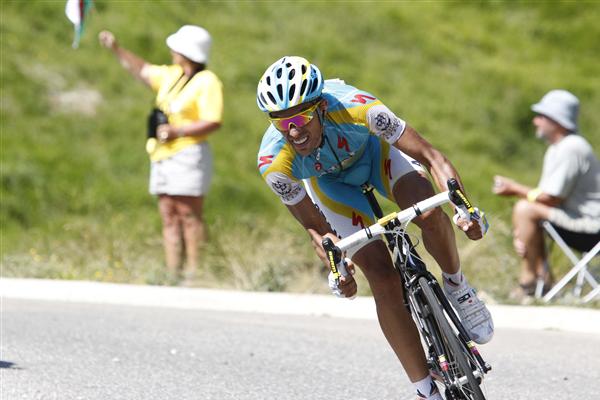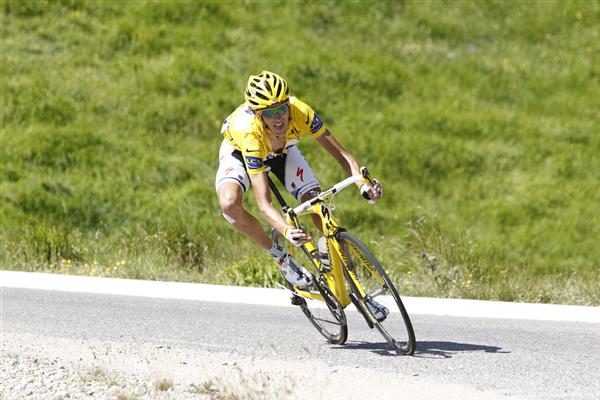Today we received more drama and controversy from a Tour that’s been anything but uninteresting. Thomas Voeckler took France’s second consecutive Pyrenean victory—the first win in a Tour for the French Champion since Jacky Durand in 1994.
But while Voeckler was enjoying his day in the sun, Andy Schleck and Alberto Contador were continuing their GC battle on the Port de Bales—with Schleck’s drivetrain playing more of a role in the action than we might have liked. (In case you missed it, here’s a pretty good video of the events as they unfolded.)
So while I agree that there’s already been way too much post-race commentary and ranting to go around—I still want my place at the table.
Here are my thoughts:
1. First of all, it might be a bit much to call Schleck’s chain problems a “mechanical†as that implies a random mechanical mishap—a cruel intervention of fate, if you will. No fate here—Andy is responsible for what happened; he was shifting under an extreme load, in the midst of an out-of-the-saddle attack. Every cyclist knows that shifting in such a fashion can cause a chain to drop, skip, or jam—no matter how expensive or well maintained the bike may be.
2. Second, for reasons I have yet to ascertain, Contador was not at the front of the group when Schleck launched his aborted move. This raises a question: why did Andy attack then? Was Contador at the back getting a bottle or talking to a teammate? Words such as “honor†and “fairness†are bouncing around a lot in reaction to what was to happen next. But was it “sporting†and “honorable†for Andy to attack at a time when he knew Contador wasn’t present to respond? Of course, the immediate answer is yes, but we’re treading on a slippery slope here. At some point, if we want to see “gloves off†racing, then we need to embrace it fully, no matter who benefits. One cannot bemoan the neutralization of Stage 2 on one hand, while criticizing Contador’s move today on the other. We can’t have it both ways.
3. Back to the Port de Bales. Once Contador realized that Schleck had attacked—a second after Vinokourov responded—he closed the move as anyone contender would have: with force, exploding from the group with his head down.  Clearly, it was Contador’s intention to blow right by the Saxo rider, a common move for anyone launching a counter-attack. (An important note: Contador did not attack, Schleck did—Contador simply countered.)
I think it’s safe to believe that Contador didn’t know (at this point) that Schleck was dealing with a problem. Contador’s main concern was closing the gap and then countering with a move of his own—he simply reacted in the moment to what was happening on the road in front him.
4. That said, once the gap was established and Contador, Sanchez, and Menchov were clear, it’s safe to assume that at least one of them knew what was happening behind. At this point, waiting for Schleck to join them would have been an extreme gesture of sportsmanship, an unselfish display of fairness and respect.
Then again, there’s a bike race to win. And after so many people complained after Saxo Bank waited for several men (including Andy Schleck) to rejoin after the crashes on the descent of the Stockeau in Stage 2, why can we blame them for racing?
It’s also important to remember that two riders who profited from the move besides Contador. Contador attracts the most anger because he’s an easy target—but Sanchez and Menchov didn’t exactly hit their brakes. Suppose Contador waited and Sanchez and Menchov rode away to take the top two places on GC—what then? Contador was between a rock and hard place, and made the best decision he could have given the situation at hand.
5. And let’s be honest—we’re talking about 8 seconds here. Even if Contador had waited, it’s unlikely Andy would have dropped him again by the top of the climb. Should Contador perform as we expect him to in Saturday’s time trial, these 8 seconds—and how he got them—won’t matter. And if the fire in his belly causes Andy to drop Contador on the Tourmalet Thursday, the 8 seconds might be meaningless as well.
6. What’s most unfortunate to me is the fact that if the chain were on the other bike and the jersey on the other rider, so to speak, people would probably be saying that Contador got what he deserved. Which begs one final question: have we ever given Alberto Contador a fair shake?
Yes, he has a different riding style than what we’re used to seeing, one that’s less calculating and more contingent upon the feel of the race, the heat of the moment, and gut reactions. He’s also come face to face with the sport’s biggest media and public image juggernaut and come through defeated and embarrassed (Contador might have won the race last year, but the everyone’s widespread display of scorn indicates he lost the war).
But does any of this enough to warrant such disdain? I don’t think so.
7. In the end, perhaps our notion “honor†in the peloton goes a bit too far sometimes. (I’m a culprit too.) Maybe the events at the end of Stage 2 lead us to read too much into the events today.  We can never say for certain how we would have reacted if in the place of Contador, Sanchez, or Menchov—they made the best decisions they could have given the information at their disposal. Hindsight’s always 20/20, but the lens through which we view the past always seems skewed. The race will go one—and it’s been a great one so far. Let’s not forget that.



22 Responses to 2010 Tour de France – Stage 15 Wrap-Up